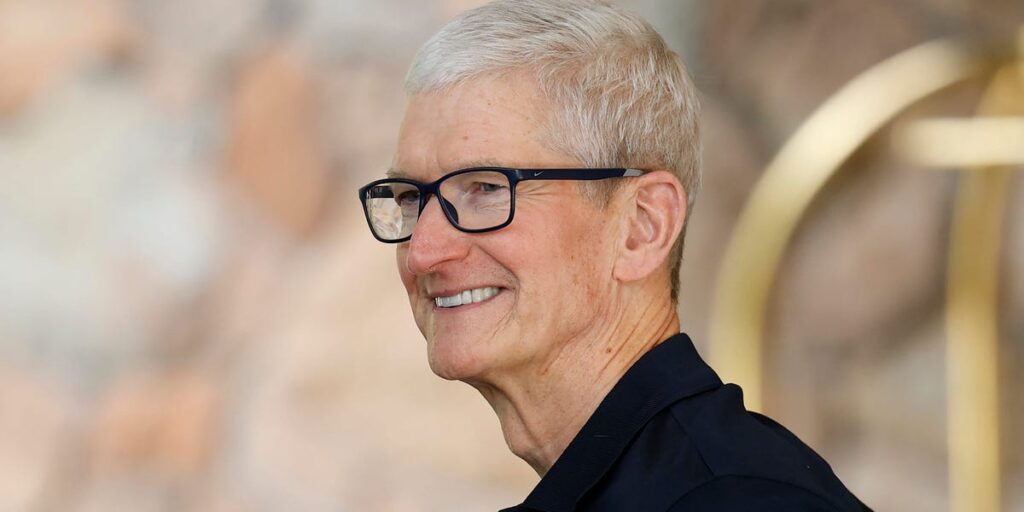On the rare occasions Apple has allowed visitors inside its secretive product design labs, gray blankets covered the tables, shielding any future products from prying eyes.
So what might be under the cloth?
Apple is famously secretive about what’s around the corner, but it’s left some breadcrumbs here and there for the careful observer. CEO Tim Cook and other executives have dropped subtle hints in recent years on earnings calls and in interviews.
Other times, Cook or other execs will be asked about the competition or what Apple’s role in a future product category could look like, and their answers help signal how the company may position itself in the coming years.
The iPhone’s role in a world with AI devices
During Apple’s recent fiscal third-quarter earnings call on July 31, for example, Cook was asked about a potential future where screen-based devices become secondary to AI-powered gadgets without screens. To that, Cook highlighted some of the iPhone’s most essential uses, like the camera, Apple Pay, and available apps.
In short, Cook appeared to suggest the iPhone isn’t going anywhere.
“It’s difficult to see a world where iPhone’s not living in it,” Cook told investors.
“That doesn’t mean that we are not thinking about other things as well, but I think that the devices are likely to be complementary devices, not substitution,” Cook said.
The elephant in the room, of course, is that Apple’s former design chief and the man behind the iPhone, Jony Ive, left the company and has since joined OpenAI’s efforts to create a non-wearable AI gadget.
Smart glasses
Other companies are exploring or launching AI devices that you can wear, investing heavily in the space. Meta’s AI Ray-Bans are the most successful smart glasses so far, with CEO Mark Zuckerberg saying sales have exceeded expectations.
While Meta and other tech giants like Google are looking into AI eyewear, Apple is also reportedly exploring a rival set of smart specs.
Interestingly enough, Cook was once a skeptic of smart glasses for years.
“We always thought that glasses were not a smart move, from a point of view that people would not really want to wear them,” Cook told the New Yorker in 2015.
By 2023, he’d changed his tune. When GQ asked about his quote from 10 years ago, Cook said his “thinking always evolves,” as he learned from his predecessor Steve Jobs.
Cook continues to hype up augmented reality, with the Apple CEO launching the $3,499 Vision Pro in 2024 and saying it was the “early innings of AR” and that “it will only get better.”
When asked about smart glasses on its most recent earnings call, Cook used the opportunity to talk about the Vision Pro but hinted at further innovation in the wearables space.
“We continue to be very focused on it,” Cook said. “I don’t want to get into the road map on it, but this is an area that we really believe in.”
Apple is widely believed to be hard at work shrinking down the form factor and making future iterations more affordable, with the ultimate goal of smart glasses with integrated lenses. Meta has publicly shown off a prototype of such a device, called “Orion,” though the tech is too expensive to mass-produce.
A foldable iPhone or iPad
While competitors, like OpenAI, work on their own secretive new products, Apple is taking its signature approach to not rush into a new product category.
“Not first, but best,” as Cook likes to say.
It’s a strategy that worked for devices like the iPod, the iPhone, and the Apple Watch, but it comes with risk. Apple was notably late to the AI arms race with the rollout of Apple Intelligence, and its overhauled AI-powered Siri has been delayed.
Foldable phones are another product category that Apple’s rivals including Google, Huawei, and Samsung have already entered. Apple is reportedly working on foldable devices but has so far demurred when publicly asked about it publicly.
When Apple executives Craig Federighi and Greg Joswiak were recently asked in an interview about it, Joswiak replied, “Who’s to say?”
When Cook was asked during Apple’s fiscal first-quarter earnings call about the iPhone’s form factor and opportunities to innovate, he hinted that there was.
“I think there’s a lot of innovation left on the smartphone,” Cook said.
Read the full article here


